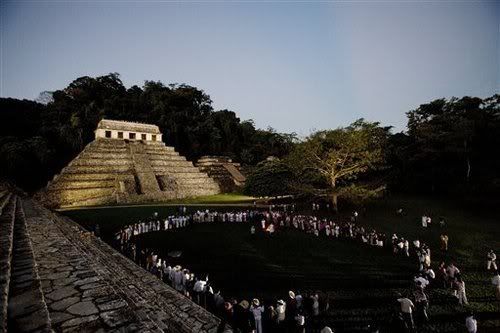Indians Gather To Save The Planet By Mark Stevenson, Associated Press Writer
 Tue Mar 11, 1:53 AM ET
Tue Mar 11, 1:53 AM ETPALENQUE, Mexico - North American Indians assembled in the shadow of ancient Mayan pyramids Monday discussed how their tradition wisdom could help save the planet, and were told that even indigenous cultures have struggled with environmental abuse.
More than 200 leaders from 71 American Indian nations in Mexico, the United States and Canada came together in this Mexican jungle to find indigenous solutions to pollution and ecological problems threatening the planet.
"Our Mother Earth is being polluted at an alarming rate, and our elders say that she is dying," said Raymond Sensmeier, a Tlingit leader from Yakutat, Alaska. "The way the weather is around the world ... a cleansing is needed."
The conference began with a pre-dawn ceremony that included fire, copal incense, chants in Lacandon Maya and blasts from a conch shell.
Speakers reminded attendees that even Indian cultures have battled with environmental abuse and pointed to theories that deforestation contributed to the collapse of the Maya who built the temples at Palenque.
"As we stand here, very near Palenque, I am mindful that some scholars have suggested that environmental stressors contributed to the decline of the Mayan civilization," said U.S. Environmental Protection Agency regional administrator Elin Miller. "The planet-wide stress on the environment today means that collaborative efforts ... are not just good things. They may well be essential for our survival."
But, as Bill Erasmus, a representative of the indigenous people of Canada's Northwest Territories noted, "part of our role is to wake up the world. It is very obvious to us all that the climate is changing."
Mexico's environment secretary, Juan Elvira Quesada, said the gathering is meant "to present the teachings of the original peoples of North America."
"In this way, the indigenous communities can become the natural guides to restoring balance and harmony in the world," he said.
The lessons they have to teach are simple — based on reviving Indian notions about ownership, use, compensation and respect.
"I sometimes talk to scientists," said Sensmeier, "and they compartmentalize things, put things in boxes and disconnect them, and doing so promotes disharmony and imbalance."
Kuetlachtli Texotik, a Nahuatl healer from Mexico whose name means "Blue Wolf," agreed.
"Our grandfathers taught us to have an integrated vision," he said. "The important thing is to look for balance.
"We should take care of what does not belong to us, for the future, because it is only ours temporarily."
Aboriginal cultures also have concrete examples to share.
Kayum Garcia's Lacandon people plant small, dense, rotating fields of jungle-friendly crops in southern Mexico and avoid pasture-hungry cattle, helping preserve the jungle without cutting it down.

"Cutting down a tree just because you want to, I just can't understand that," said Garcia.
The Nahuatl-speaking Aztecs were able to use Mexico City's extensive lake system as both a source of food and a flood-control mechanism.
The lakes were drained after the Spanish arrived, and now the metropolis suffers a constant threat of floods.
Some of the lessons are even simpler, reminiscent of advice grandparents often use.
"You'd catch one fish, just one, and you never played with your food, never wasted it," said Sensmeier.
"We used everything."
-----------------------------------------------------------------------------------
There are many things we all can learn from our ancestors and from the Native People of our planet. At one time we were all Native People, having to survive on what we could hunt, grow, and make ourselves. Many have lost this talent due to "civilization". The industrial revolution made it so that people do not have to rely on the land to live and work. Because of this, we have all become wasteful and materialistic. Our wastefulness has a very large impact on our planet.
Everything we do, every day, effects the harmony and balance of the ecosystem of our precious Mother Earth. Most people only think of the pollution from driving their car or the stuff that goes out with the trash. But it is the mundane things that also harm Her.
Many countries do not have the same strict Pesticide standards we have here in the United States. According to a FDA report released in 2003, pesticide violations were cited in 6.1 percent of imported foods sampled versus 2.4 percent of domestic products.
And there's more imported food in the nation's supermarkets than ever before. According to the CDC, food imports to the United States have almost doubled in the past decade, from $36 billion in 1997 to more than $70 billion in 2007.
Trouble is, inspections by the FDA -- either at the source of production or at the borders -- can't keep up. The agency is responsible for inspecting all imported foods with the exception of meat and egg products, which are covered by the Food Safety and Inspection Service, part of the U.S. Department of Agriculture.
Overall, there's been an 81 percent drop in FDA inspections since 1972.
Jim Harkness wrote a fascinating article about the problems with our food system. He is the president of the Institute for Agriculture and Trade Policy , a Minneapolis-based policy research center committed to creating environmentally and economically sustainable rural communities and regions through sound agriculture and trade policy.
In his article, he state "
Our food system's increasing dependence on imports is no accident. Import dependency is a defining characteristic of an industrial food model driven by U.S. farm and trade policies over the last half century on behalf of agribusiness. U.S. farm policy has encouraged the mass production of only a few cheap crops largely used as food ingredients, animal feed and exports. U.S. trade policy has aggressively pushed for the removal of trade barriers paving the way for the global food trade.
Missing from this industrial model is a national priority to produce healthy food to feed Americans. For example, most rural Midwest supermarkets, surrounded by farms, import nearly all their food from elsewhere in the country and around the world. Taken to an extreme, some chicken grown in the United States actually is sent to China to be processed and then re-exported back the United States!
We have built a system of production and trade that treats food the same as computer parts. Cracks in this system manifest themselves in different ways, including the loss of family farms in the United States and worldwide, declining soil and water quality, and a rise in food-related health problems including obesity. But food safety dangers get most of the headlines, because these can be quickly fatal.
The tainted animal feed case is a stark example of these vulnerabilities. Feed contamination in China found its way to the United States food supply through hogs in at least six states and at least 2.5 million chickens....
Congress is writing a new Farm Bill. It's an opportunity to accelerate the transition toward a more locally based food system by funding greater crop diversification, incentives for local purchasing in schools and other government institutions, and full implementation of country of origin labeling in 2008. It's time to put the public's interest ahead of agribusiness in setting our nation's food policy."
As many of you may have heard, a five-month Associated Press investigation has determined that trace amounts of many of the pharmaceuticals we take to stay healthy are seeping into U.S. drinking water supplies, and a growing body of research indicates that this could harm humans.
The study has found a vast array of pharmaceuticals in the drinking water supplies of at least 41 million Americans. They include antibiotics, anti-convulsants, mood stabilizers and sex hormones, as well as over-the-counter pain medicines.
But humans are not the only ones who consume this water. The plants and animals of Mother Earth do to. Reports have been published showing reproductive problems in many types of fish, kidney failure in vultures, impaired reproduction in mussels, inhibited growth in algae.
I'm not saying that pharmaceuticals are bad thing, when taken in moderation. We all need to become advocates of our own health care and not always rely on the prescriptions the doctor is handing us. Many of our ancestors survived with the mundane health issues with out the drugs we have available to us today. Many used herbs. Now before you start thinking, I gone "weird" on you, think about the alternatives there are when it comes to herbs. I will say that not all illness and diseases can be cured with herbs, but it never hurts to try something new.
Have you ever wondered way carnivores like cats and dogs like to eat grass, especially the mint and catnip variety? Carnivores eat these plants because of they have upset stomaches. Grasses are known to settle upset stomachs.
There are many things we all can change in our lives for the betterment of Mother Earth and Her Children. The following link will give you an idea of your Carbon Foot print. A Carbon Footprint is a measure of the impact our activities have on the environment in terms of the amount of greenhouse gases we produce. It is measured in units of carbon dioxide. I hope this will show you areas in which you can change in order help Mother Earth be healthy again.

"Teach your children what we have taught ours, that the earth is our mother. Whatever befalls the earth befalls the sons of the earth. The earth does not belong to man; man belongs to the earth. Man did not weave the web of life; he is merely a strand in it. We do not inherit the earth from our ancestors; we borrow it from our children."
- Chief Seattle circa 1854








0 Comments:
Post a Comment
Subscribe to Post Comments [Atom]
<< Home